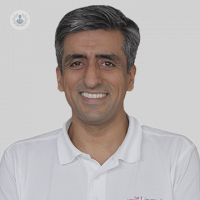Will lingual braces affect my speech?
Written in association with:The tongue is an amazing organ. It is essential in providing the sense of taste, allowing us to eat, drink, and swallow, and enabling us to speak. Highly flexible, sensitive, and adaptable, the tongue performs the most complex and specialised motor activity that the human body can do. Because lingual braces take up space on the back of the teeth, there is potential for them to have an impact on the normal movement of the tongue. Leading orthodontist Dr Asif Chatoo explains:

How will my speech be affected by lingual braces?
Having lingual braces can affect different patients in different ways. Factors such as the size and shape of the bite, the amount of control we assert over our tongues, and the strength of our jaw muscles vary from person to person. Some people will quickly adjust to the presence of a lingual brace and find that their speech is affected very little, if at all. Others, however, may run into difficulties navigating the new metal structure with their tongue, and might develop a lisp or a similar issue with pronunciation. This can, in turn, make the patient feel anxious and self-conscious at the start of their treatment.
How long does this effect usually last?
The tongue is a very sensitive organ and is usually hyper-aware of even the slightest change in the mouth, such as an ulcer or a chipped tooth. However, it is also highly adaptable, and will often adjust to the new sensation of a lingual brace within a week or two. In other patients, however, a lingual brace can interfere with speech and for these patients we recommend an appointment with our voice tutor therapist.
In what situations is speech therapy needed?
There are several professions in which speech impediments like a lisp are problematic. Examples include actors, singers, and television presenters. An appointment with a speech therapist is an option for patients whose speech might be affected by lingual braces.
These first two weeks after the braces go on are usually a period of adjustment. Many patients adapt to the lingual braces in this time. Patients of the practice are given wax to place over the braces to stop the tongue rubbing on the metal. However, some patients still feel anxious and speech therapy can help them to train their tongue and assuage their anxiety.
What does speech therapy involve – and how much would I need?
The tongue is mostly muscle and can be trained to do its normal job by moving in a different way. This can help to minimise a lisp or similar impediment brought on by lingual braces.
Techniques used in speech therapy generally involve developing awareness of your oral habits, such as how you hold your jaw. For speaking with lingual braces, the key is to create more space in the mouth by opening up the back of the throat. The tongue must then learn how to become independent from the lower jaw and lips and reach out to the hard alveolar ridge behind the teeth of the upper jaw.
The amount of speech therapy needed depends entirely on the patient, but in many cases, as few as two or three sessions can be sufficient to help the patient become more confident in speaking in a new way.
If you are interested in lingual braces or having orthodontic work done, book an appointment on Mr Chatoo's profile.



